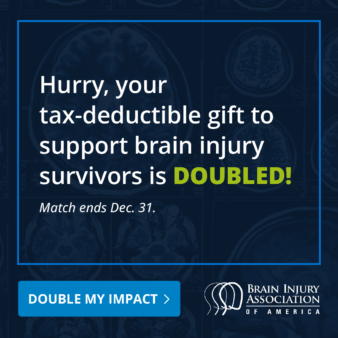Policy Corner: September 7, 2018
Categories: Policy Corner Archives
Senate Passes Labor-HHS-ED Appropriations Bill
In late August, the Senate passed the fiscal year 2019 Labor, Health and Human Services (HHS), and Education appropriations bill. The House of Representatives had combined the bill with funding for the Department of Defense into H.R. 6157, which the Senate amended. The House and Senate are now in negotiations to reconcile differences. The Senate bill provides flat-funding for the HHS’ Administration for Community Living (ACL) traumatic brain injury (TBI) programs and the Centers for Injury Control and Prevention (CDC) Injury Center TBI programs, while the House provides additional funding, approximately $40 million, to CDC’s Injury Center for Opioid Overdose Prevention and Surveillance and $2 million to expand the Injury Control Research Centers (ICRC’s). The Senate approved a $4 million increase for the National Institute on Disability, Independent Living, and Rehabilitation Research (NIDILRR) program, while the House recommended level funding. The Senate also provided level funding for the ACL Independent Living program, while the House recommended a $6,817,000 increase in funding. The current fiscal year ends Sept. 30, so Congress will need to complete appropriations bills or other measures to continue to fund the federal government starting Oct. 1.
House Committee Holds Hearing on MFP
The House Energy and Commerce’s Subcommittee on Health held a hearing Wednesday on “Opportunities to Improve Health Care,” which included testimony in support of the EMPOWER Care Act, H.R. 5306, to provide funding for the Money Follows the Person (MFP) program. H.R. 5306 provides Medicaid incentives to transition people with brain injury and other disabilities, as well as older adults, from nursing and institutional settings to home and community. Testifying on behalf of the bill was Curtis Cunningham, Vice President of the National Association of States United for Aging and Disabilities.
A briefing was held the next day to further discussion on the importance of the legislation. The Consortium for Citizens with Disabilities (CCD) Long-term Services and Supports (LTSS Taskforce), Disability and Aging Collaborative (DAC) and the LCAO Health Committee, in conjunction with Reps. Brett Guthrie (R-Ky.) and Debbie Dingell (D-Mich.), hosted the “Policy Briefing: Helping Seniors and People with Disabilities Get Back Home.” A panel of experts and consumers talked about how the MFP program helps seniors and people with disabilities return home to their communities.
Senate HELP Committee Holds Hearing on NIH Research
The Senate Health, Education, Labor and Pensions (HELP) Committee held a hearing August 23 entitled “Prioritizing Cures: Science and Stewardship at the National Institutes of Health” (NIH). The main focus of the hearing was oversight, during which NIH Director Francis Collins and his colleagues answered questions regarding the type of research NIH is funding, key findings that research has produced, breakthroughs the agency anticipated, and how legislators and agency leaders could optimize NIH’s effectiveness. The hearing featured discussions regarding opioid addiction, organ transplants, and gene therapy, among other topics.
CDC Releases New Guideline on Pediatric Mild Traumatic Brain Injury
The Centers for Disease Control and Prevention’s new Pediatric Mild Traumatic Brain Injury (mTBI) Guideline, CDC Pediatric mTBI Guideline, has been published in JAMA Pediatrics. The Guideline consists of 19 sets of clinical recommendations that are applicable to healthcare providers who care for patients with mTBI (also referred to as concussion) in all settings, and seeks to improve the care of young patients with this injury. The report includes five key practice-changing recommendations:
- Do not routinely image pediatric patients to diagnose.
- Use validated, age-appropriate symptom scales to diagnose mTBI.
- Assess for risk factors for prolonged recovery, including: a history of mTBI or other brain injury, severe symptom presentation immediately after the injury, and personal characteristics and family history (such as learning difficulties and family and social stressors).
- Provide patients with instructions on returning to activity customized to their symptoms.
- Counsel patients to return gradually to non-sports activities after no more than a 2-3 days of rest.
ACL Plans Celebration of NIDILRR’s 40th Anniversary
The Department of Health and Human Services’ (HHS) ACL is planning a 40th anniversary of the National Institute on Disability, Independent Living, and Rehabilitation Research (NIDILRR) Oct. 18 from 1 p.m. to 5 p.m. (ET) in the Great Hall of the HHS Hubert H. Humphrey Building in Washington, D.C. The event will bring together Directors from throughout NIDILRR’s history, celebrate featured accomplishments and contributions made to the field by NIDILRR grantees, and focus on the future direction of disability, independent living, and rehabilitation research. Registration is required and space is limited. Please register by October 5th. Click here to register. Questions may be sent to nidilrr.acl.40@neweditions.net.
BIAA Expresses Concerns Regarding Prior Authorization Under Medicare Advantage
As a member of the Coalition to Preserve Rehabilitation (CPR), the Brain Injury Association of America (BIAA) joined other organizations in expressing strong support for a bipartisan Congressional sign-on letter from Reps. Phil Roe (R-Tenn.) and Ami Bera (D-Calif.) to the Centers for Medicare and Medicaid Services (CMS) Administrator Seema Verma regarding the use of prior authorization in Medicare Advantage (MA) plans.
The letter calls for CMS to work to reduce barriers to patient care by improving how prior authorization works under Medicare Advantage. It expresses concerns that CPR members shared in a similar letter that was sent April 2018. CPR’s letter relayed concerns that prior authorization and other similar practices used by MA plans may be sources of increasing barriers to accessing needed care, particularly inpatient and outpatient rehabilitation services and devices, for beneficiaries nationwide.
BIAA gratefully acknowledges the Centre for Neuro Skills and Avanir Pharmaceuticals for their support for legislative action.

